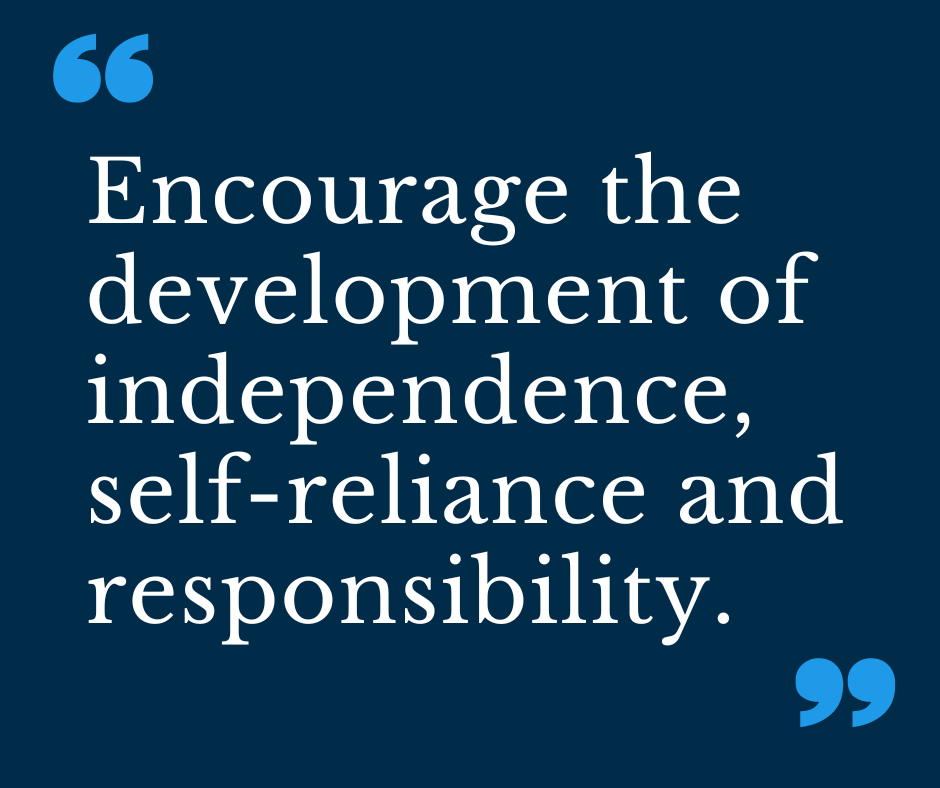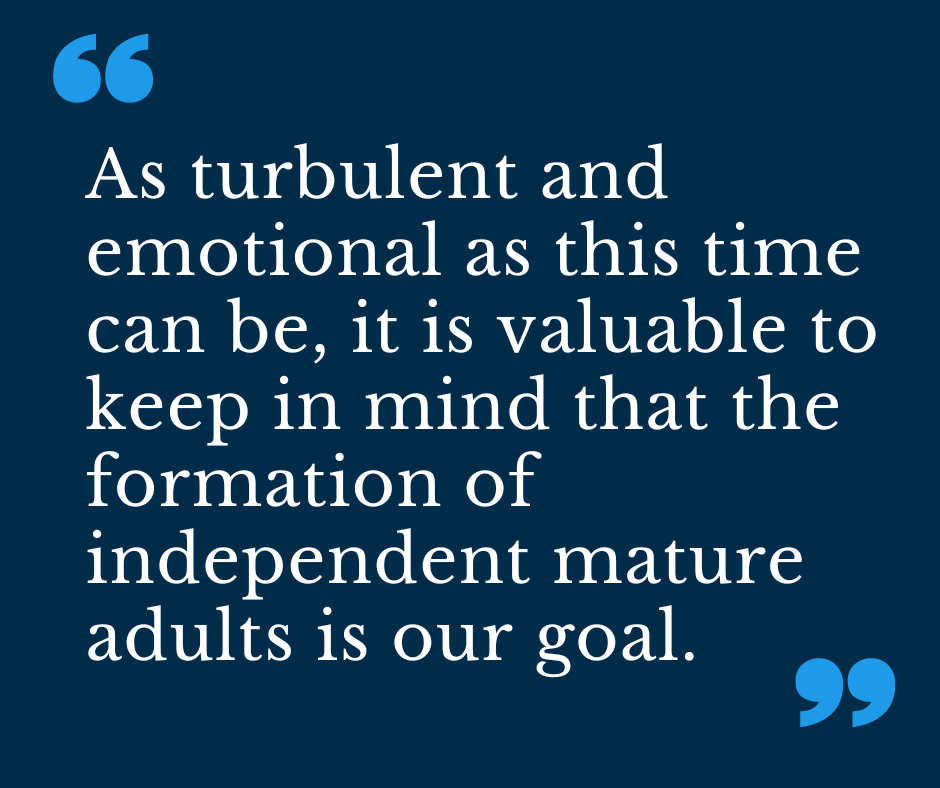Words by Debbie Pitcairn, Director of College Counseling & Registrar
This time in the lives of our seniors and their families is exciting and scary. Expectations and relationships are changing and evolving fast, and new modes of interacting and communicating need to be negotiated.
The process of becoming an adult begins before seniors graduate and continues for several years. Adolescents must separate from the family and form their own identities in order to successfully mature into adults – which is our goal!
This process takes time and can be turbulent, but it is helpful to know what to expect and to understand what is happening.
Mixed Emotions
Seniors are experiencing fear and excitement simultaneously; they cannot wait to grow up and be independent, and, yet, they feel terror and grief at the coming “loss” of family and the security and familiarity of home. The result is an emotional rollercoaster that seniors and parents ride together throughout the spring and summer!
I am reminded of the vivid “swimming-pool” metaphor that Lisa Damour describes in her book, Untangled: Guiding Teenage Girls Through the Seven Transitions into Adulthood (pages 21-24): children will swim confidently and independently in the pool of life until they need support and then cling to the pool wall to rest and recover. When ready, they forcefully push off the wall back into the open waters of life. And, boy, that push-off can be painful!
I am sure many of us recognize this pattern in our growing children. Our job is to prepare them for that pool. Encourage the development of independence, self-reliance and responsibility.

Academy at the Lakes’ curriculum includes personal finance instruction that teaches them about essential financial skills such as banking, bill paying, debt, savings, checking accounts, credit cards, and budgeting to make sure they have an opportunity to put some of these skills to use before they leave for college.
At home, have them practice doing laundry, some simple cooking, making their own doctors’ appointments, taking a car in for service, even sewing on a button! They will gain confidence in their ability to handle these daily tasks on their own.
New Challenges
During that first year of college, students are separating from their parents and working to differentiate themselves as independent young adults.
First of all, appreciate the challenges of their position and how much courage it takes to meet them:
- Students leave behind their families, friends, and everything they know to start in a new unfamiliar place where no one knows them or their reputation.
- They share a small living space with a stranger – sometimes sharing a bedroom and bathroom for the first time – and have to negotiate and communicate openly about everything.
- They are insecure in their ability to be successful in this place: they have more work and less structure, direction and feedback than they have ever had before.
- They have more free time, more choices, and less guidance in everything: friends, extra-curricular activities, social situations, classes, partners.
(Letting Go: A Parents’ Guide to Understanding the College Years, by Karen Levin Coburn and Madge Lawrence Treeger, Harper, 2009. pg 191-192.)
Helpful Advice
Have meaningful, important conversations as you go.
There is much we wish to impart to our growing, soon-to-be-independent children. Don’t wait until the last moment to have a big, long, heavy talk. Spread them out; pick your moments at appropriate times.
You have probably been having these conversations – about values, relationships, alcohol and drugs, good decision-making, safety, etc. – for a long time. Make plans to do some specific things with your child over the summer (a lunch, a college/dorm shopping trip, a trip to the college campus, or during a car ride, etc.) and initiate a conversation around one or more of these topics.
Make sure to leave lots of time for listening, not just lecturing. Ask your child for their opinions, hopes, and fears. Give them a chance to ask questions and tell you what they are thinking.
One of the conversations you should have is about finances.
What are the expectations for the college years?
What expenses are the student’s responsibility and what are the parents’ responsibility?
Be explicit and clear about what costs belong to the student (car insurance? gas? clothing? entertainment?) and which belong to the parents (books? medical costs? transportation to and from college? phone?).
Will the student get an allowance?
Will the student need to get a job?
Does your student have or need a credit card and how will it be handled?
What happens if the student runs out of money?
How will student loans be handled?
Give them space.
Communication is so different today than when we were in college. I talked with my parents once a week by landline, and I was the one who called them. Today, with cell phones, text, email, FaceTime, Zoom, etc., there can be almost constant communication between parent and college student, even if they are far away.
Remember, they need to separate. This requires space and time. Do not call too often. Let them call you. I recommend talking about your expectations around communication before your child goes off to college and understanding what each party needs – and compromise!
However, even if your child is amenable to daily phone calls – restrain yourself. Make yourself unavailable, sometimes, and let your child experience independence. They will grow more for it.
Don’t solve their problems but do remind them that you are confident they can do that on their own.
Some children call when they are excited and happy. Some call when they are down and stressed. You will get to know your child’s patterns. One thing is sure, though: whatever they are feeling is sure to change quickly!
Try not to get sucked into your child’s panic or temporary blue mood or euphoria or crazy idea! Take a breath and stay positive and even-keeled. Your job is to listen and validate; be a sounding board and support.
You might suggest resources, people, or places to go to get help if needed. If you are truly worried about your child’s mental or physical health, call a Dean of Residential Life or the Advising Office and let them know your concerns.
Spend some time familiarizing yourself with campus resources for healthcare, both physical and mental, safety systems, emergency communication systems, Offices of Advising, Registrar, Bursar, etc.
This way you can advise your child when they call you when sick or unwell or need to deal with an academic or financial issue, and you can redirect them to the resource they need.
Make sure to complete any paperwork or online registration you need to do to be included in campus communications.
Academic Expectations
Watch your expectations for academic performance.
While students should be applying themselves seriously to their classes, it is important to realize that much of what is learned in college is what happens outside the classroom (Letting Go, pg 71).
The human development that goes on in college is absolutely critical to the “liberal arts” education that employers recognize as providing the basis of the future development of the employee: the skills to learn, solve complex problems, collaborate effectively, deal with diversity, think creatively, innovate, research, synthesize, lead and manage others, team-build, network, etc. These are not distance-learned, or learned only in a classroom, but on the field, in the lab, on the job, in clubs and organizations, during internships, study abroad, and out serving in communities.
Employers look for these high-impact, formative experiences in prospective employees. (There is Life After College: What Parents and Students Should Know About Navigating School to Prepare for the Jobs of Tomorrow, by Jeffrey Selingo, 2016.) Teach your child that career development and resume-building start the first day on campus and not upon graduation from college.
Parent Challenges
As seniors are making their way into early adulthood, many parents are also feeling their way into Empty-Nesthood.
Parents can feel as ambiguous and conflicted about this major transition in their lives as their children do in theirs. Be aware of your feelings and how it affects your interactions with your child. The combination of the impending departure of your child and greater freedom from daily child-rearing responsibilities can be bittersweet.
We are sad to be losing them but proud of their accomplishments and thrilled at their opportunities. Grief at the passing of this stage of life and exhilaration at the opportunities that come with the next create our own rollercoasters.
This is a wonderful time to develop new, or return to old, passions, interests and hobbies. The quiet and orderliness, the freedom to engage in one’s own interests, make one’s own schedule, and spend time with a spouse or partner can be very satisfying and joyful. We can look forward to and love it when our children come home to visit and be just as happy when they leave again!
As turbulent and emotional as this time can be, it is valuable to keep in mind that the formation of independent mature adults is our goal.

This process does not end with high school graduation but continues through college and into a young person’s 20’s.
“Letting Go” of our children does not mean losing them.
A successful development and separation process results in the very rewarding outcome of healthy, mutually respectful, close relationships with our mature, independent adult children.










